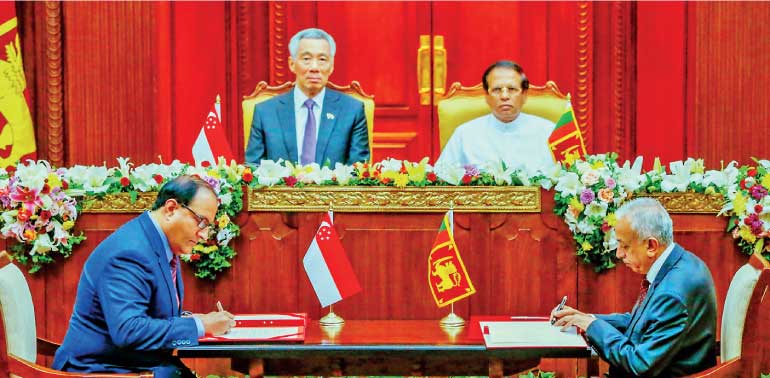Monday Feb 23, 2026
Monday Feb 23, 2026
Wednesday, 24 January 2018 00:58 - - {{hitsCtrl.values.hits}}

President Maithripala Sirisena and Singapore Prime Minister Minister Lee Hsien Loong watch as Development Strategies and International Trade Minister Malik Samarawickrama (right) and Singapore’s Trade and Industry Minister S. Iswaran sign the free trade agreement between the two countries yesterday in Colombo.
Opening a new chapter, Sri Lanka and Signapore yesterday signed the Free Trade Agreement (FTA) marking the first time Sri Lanka has entered into a bilateral trade deal in over a decade, which also includes services, investment and ecommerce for greater economic cooperation.
The FTA, whose scope is wider than the proposed India and China agreements, was signed at the Presidential Secretariat with Development Strategies and International Trade Minister Malik Samarawickrama signing on behalf of Sri Lanka and Singapore’s Trade and Industry Minister S.Iswaran signing for Singapore. President Maithripala Sirisena, Prime Minister Ranil Wickremesinghe and his Singaporean counterpart Prime Minister Lee Hsien Loong were also present at the occasion.
The Singaporean Prime Minister is in Sri Lanka on a three-day visit, which began on Monday, to mark over five decades of bilateral realtions between the two nations. The high point of his visit was the FTA signing, which was given Cabinet approval earlier this month.
Following the signing the Government released select details of the FTA, which noted that it would be part of reforms to boost quality employment and new trade and business partnership opportunities.
“To have done our first comprehensive agreement with Singapore – a country regarded as being one of the most open and liberalised economies and having high-quality institutions – is an especially important milestone for Sri Lanka,” read a statement released by the Development Strategies and International Trade Ministry.
“It signals the commitment of the government to usher in an era of openness for Sri Lanka, and become a formidable economic hub in the Indian Ocean. This agreement is an important part of the new ‘National Trade Policy’ launched last year, and is a linchpin in the ongoing trade policy reforms. To complement this, SL is undertaking domestic reforms and initiatives to make Sri Lanka internationally competitive,” it assured.
The Government will continue introducing new regulations and laws under its Enterprise Sri Lanka effort introduced in Budget 2018, as well as the National Export Strategy, Innovation and Entrepreneurship Strategy and reforms to improve the Ease of Doing Business and trade facilitation that were embarked upon over the last two years.
“The Singapore-Sri Lanka FTA is part of a broader strategy of looking East to renew our trade relationships. While we focus on growing and sustaining in our traditional markets of the US and Europe, we have begun to diversify our markets towards Asia and focus on plugging into Asian supply chains.
“This FTA is our first agreement with a South East Asian country – and we envisage this as a first step towards closer integration with ASEAN, and potentially be part of the RCEP – Regional Comprehensive Economic Partnership - in the future.”
However, under the Rules Of Origin (ROO) no ASEAN cumulation is allowed under this FTA. Standard ROO agreed is 35% Value Addition and CTH (change of tariff heading). Additionally, there are Product Specific Rules on 2000 tariff lines and product chemical rules, which are exceptions to the ROO and aimed at safeguarding local businesses, the document said.
The Government was confident the scope of the FTA is “very progressive”, noting “it is wider than the proposed China and India agreement” covering telecommunications, financial services, ecommerce and government procurement.
“Singapore has recognised that the e-commerce chapter in this FTA is quite a progressive one.”
“Sri Lanka is not a member of the Government Procurement (GP) WTO agreement, but as a step towards reform, for the first time SL has included a GP chapter in this agreement. It covers international competitive bidding (excluding national bidding). It also embodies procedural fairness and transparency in procurement. The chapter ensures alignment with national procurement guidelines and does not deviate.”
On goods (and the tariff liberalisation programme – TLP), Singapore already has 99% of tariff lines zero-rated. But the agreement recognises that Sri Lanka has to go step by step and therefore has agreed to liberalise 80% of tariff lines, 50% of lines immediately to zero (around 3,600 lines), 15% over the first to sixth year in equal installments, and 15% over the sixth to twelfth year.
Items that remain on Sri Lanka’s negative list are those that are sensitive for Government revenue and other domestic grounds, namely petroleum and related products, tobacco and related products, alcohol and spirits.
“The real focus of this FTA is on investment from Singapore in services and manufacturing – potential for diversification of exports through the trade investment nexus and new JV opportunities for Sri Lankan companies,” the Government insisted.
“The investment chapter will give a strong signal to prospective Singaporean investors by providing protection to investors, predictability and transparency. The agreement provides a binding commitment and framework, which we didn’t have earlier.”
Both countries did not commit to independent movement of professionals (under Mode 4) in this FTA; so only Modes 1 to 3 have been agreed on. Sri Lanka has undertaken liberalisation in some important areas for business including testing labs that are expected to help local firms that now have to send samples to Singapore, sports and recreation, maritime, environmental services (pollution, waste water, energy efficiency, noise abatement, etc). In services, only Singaporean nationals are recognised.
Even though people movement has not been allowed by the FTA, Sri Lankans can benefit from the service liberalisation by Singapore as Mode 4 business visitors and intra corporate transferees, the Government said.